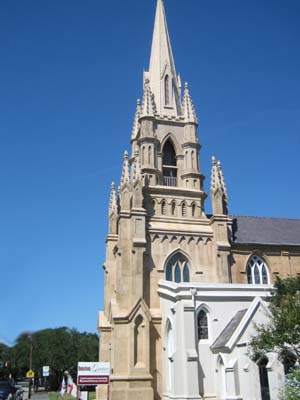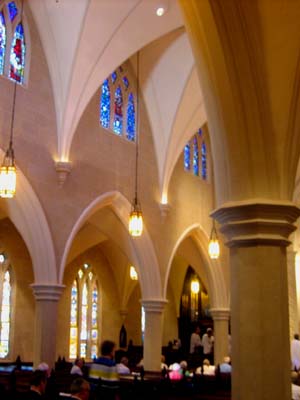| |
 |
 |
 |
| Comment on this report, or find other reports. |
 |
| Our Mystery Worshippers are volunteers who warm church pews for us around the world. If you'd like to become a Mystery Worshipper, start here. |
 |
| Find out how to reproduce this report in your church magazine or website. |
|
|
| 2577: Grace
Church, Charleston, South Carolina, USA |
 |
 |
 |
Mystery
Worshipper: Sed Angli.
The church:
Grace Church, Charleston, South Carolina, USA.
Denomination:
The
Episcopal Church, Continuing
Diocese of South Carolina.
The building:
Dating from 1846, Grace Church is a Gothic-style structure of
smooth stone. The building survived shelling during the Civil
War and a major earthquake in 1886, and has recently undergone
major renovations to the exterior. The nave is filled with colorful
stained glass both in the clerestory and ground-floor level
and has two side aisles separated from the central nave by stone
arcades. The sanctuary area is crowned with an ornate stone
apse. The interior stonework is smooth, light-colored, and well-maintained.
The stained glass diffuses a large quantity of natural light
into the room.
The church:
South Carolina has recently been the seat of much controversy
within the Church. In 2012 the Diocese of South Carolina voted
to withdraw from the Episcopal Church over certain actions that
the diocese viewed as contrary to scripture. The Episcopal Church
has sued over who has rights to the name, seal and property
of the diocese and who may legitimately call himself its bishop.
Grace Church is among the very largest parishes remaining in
the diocesan structure that is in relationship with the national
Episcopal Church (the Continuing Diocese of South Carolina).
The neighborhood:
Charleston, located on the Atlantic coast, is South Carolina's
second largest city. The entire city is dripping with history
(and, in the high summer, humidity). The church campus is in
the midst of the historic Harleston Village, one of Charleston's
most diverse and lively districts, in the vicinity of the College
of Charleston.
The cast:
The Revd John Zahl, associate priest, was the celebrant. The
Revd Canon J. Michael A. Wright, rector, preached.
The date & time:
Twelfth Sunday after Pentecost: August 11, 2013, 11.00am.
Comment:
We have received a comment on this report.
What was the name of the service?
Choral Eucharist, Rite II.
How full was the building?
The sizeable nave was pretty full, particularly for mid-August:
probably 80 per cent filled at least.
Did anyone welcome you personally?
We were greeted by two very friendly and helpful ushers, one
of whom advised us of the best way to deal with parking in the
area. We felt warmly and genuinely welcomed to the parish.
Was your pew comfortable?
The pew was uncushioned wood, appropriately comfortable for
the worship of God. Rather than an attached kneeler rail, individual
kneeler-stools populated the pews.
How would you describe the pre-service
atmosphere?
My wife and I were mostly captivated by the guild of change-ringers
tolling the bells, but the heat and humidity eventually drove
us into the nave to find our seats, probably six or seven minutes
before the organ prelude began. The room was filled with soft,
mild chit-chat among the parishioners, which unfortunately only
got louder and more noticeable after the organist began the
prelude.
What were the exact opening words of the
service?
The opening sung words were, "O Lord, increase our faith," the first phrase of the choral introit.
The opening spoken words were, "Blessed be God: Father, Son, and Holy Spirit."
What books did the congregation use during the
service?
Book of Common Prayer 1979 (mostly printed in the service
bulletin); Hymnal 1982. Scripture readings (Old Testament,
epistle, and gospel) were from The Holy Bible, New Revised
Standard Version.
What musical instruments were played?
The music was led from and accompanied by a stupendous pipe
organ, an opus of the Reuter Organ Company of Lawrence, Kansas.
Did anything distract you?
The most egregious offenders in the chit-chat department were seemingly positioned in the pew directly behind ours. Running commentary lasted through the second scripture reading at least.

Was the worship stiff-upper-lip,
happy clappy, or what?
The worship was what I like to describe as "broad-church ritualist"
– classical hymns accompanied by the organ, unadulterated
liturgy from the 1979 BCP (Rite II), and appropriate vestments
all around (no cassock-albs in sight). The low-church roots
of the Episcopal Church in South Carolina were revealed in the
assisting minister at the altar, who wore a stole over his clergy
shirt, but that oddity was counterbalanced by the crucifer clad
in tunicle and gloves.
Exactly how long was the
sermon?
10 minutes on the dot.
On a scale of 1-10, how
good was the preacher?
7 – Canon Wright spoke with a smooth-as-silk radio voice
that I could listen to all day long and immediately grasp and
comprehend every word uttered. It was no surprise to later learn
that he is Canadian and the scion of a long line of clergy.
In a nutshell, what was
the sermon about?
While incorporating ideas from the epistle and Old Testament
reading, the sermon focused on the first line of the gospel
lesson, "Do not be afraid, little flock, for it is the Father's
good pleasure to give you the kingdom." He must have repeated
that line six or seven times, to good effect: Do not be afraid.
Which part of the service was like being in
heaven?
Robust congregational singing and glorious music from the choir
and the organist.
And which part was like being in... er... the other place?
The chit-chat from the people behind us, which continued into
the choral Kyrie. I actually had to do the turn-around-and-look
thing once or twice.
What happened when you hung around after the service looking lost?
As the organist began the postlude, I wandered against the flow
of traffic up to the front of the church, admiring the stained
glass windows but generally trying to look like a visitor. At
least two church members (who were not ushers that day) made
eye contact with me and said things along the lines of, "We
are so glad you chose to worship with us today. Thank you for
being here. I do hope you visit again in the future." It was
the perfect balance of friendly welcome hospitality without
being overbearing or suffocating.
How would you describe the after-service
coffee?
My wife slipped out of the handshake line to go to coffee hour
in the parish hall, and reported that there were four or five
trays of brownies and cheese and crackers. Lots of people attended,
and two women were posted at the door to welcome people as they
entered. If someone wanted take the initiative to mingle and
meet people, my wife had the impression of warmth and friendliness.
How would you feel about making this church your regular (where 10 = ecstatic, 0 = terminal)?
8 – My own personal churchmanship would lead me to want
to visit the Church of the Holy Communion, the Anglo-Catholic
parish in town, but I found worship at Grace to be uplifting,
prayerful, and embodying the beauty of holiness.
Did the service make you feel glad to be a
Christian?
Definitely. I was sad that the final communion hymn wasn't sung,
just because I wanted to experience more of that robust congregational
singing. And the singing by the choir (which I believe was predominately
volunteer) was among the best I've heard.
What one thing will you remember about all this in seven days' time?
The two choral anthems, at the offertory and communion. Also,
the stunning stained glass (particularly the Great Commission
window over the west door and the Sacraments window over the
altar), and the organ pedals rumbling the floor of the nave. |
|
|
 |
 |
 |
| We rely on voluntary donations to stay online. If you're a regular visitor to Ship of Fools, please consider supporting us. |
 |
 |
 |
| The Mystery Pilgrim |
 |
| One of our most seasoned reporters makes the Camino pilgrimage to Santiago de Compostela in Spain. Read here. |
 |
 |
 |
| London churches |
 |
| Read reports from 70 London churches, visited by a small army of Mystery Worshippers on one single Sunday. Read here. |
| |
|
|
|
|


